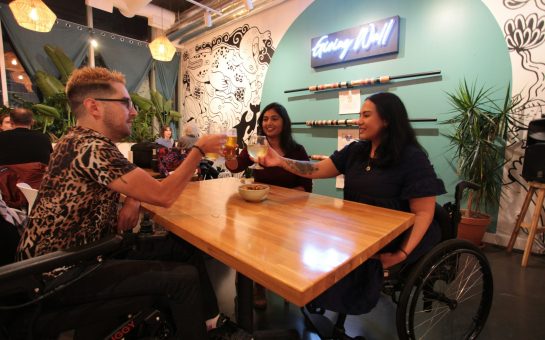The award-winning Manchester Science Festival is hoping to go off with a big bang when its 11-day extravaganza kicks off next week.
Produced by the Museum of Science and Industry, the eighth annual festival begins October 23, and will include cutting-edge discoveries, workshops, and internationally acclaimed art among its attractions.
As well as within the museum itself, events will take place at more than 40 locations, including pubs, galleries and other venues across Greater Manchester.
And festival director Dr Marieke Navin told MM the programme has been designed to reach out to everyone – not simply science bods.
“The audience is the heart of everything,” she said.
“If they’re not the kind of people interested in universities and museums they can check out what’s going on in the pubs, theatres and galleries.
“It’s an exciting, innovative and creative program that gets people excited and curious. We want them to feel like they want to find out more, and that you can have fun with science.”
Notable among the attractions is an exhibit exploring one of the most ground-breaking technologies in development today.
3D: Printing the Future will examine the rise of 3D printing and its growing possibilities.
Sarah Baines, curator of the exhibition, said it was previously shown in London, but has been updated to include what she says are the ‘northern contenders’.
From synthetic fabrics to life-saving medical applications, the technology is becoming something that may have the power to shape our future.
Ms Baines said: “A lot of people have heard of 3D printing but wouldn’t really know what to do with it. It’s moving so fast and is such an exciting area. We want people to see it with their own eyes.
“We want to show people the sheer variety of applications that 3D printing can have.”
Also on show will be the world premiere of Lovelock Art Commission.
Inspired by British scientist James Lovelock – renowned for proposing the Gaia Hypothesis – the exhibit features work from internationally acclaimed artist Marcus Coates.
Coates will present his audio-visual installation, The Sounds of Others, a Biophonic Line, exploring elements of the Gaia Hypothesis and how the sounds of different species of animal reveal connections between them.
For some exhibits, attendees will also have a chance to meet the experts behind them – something Dr Navin hopes will change the way people think of scientists.
She said: “We’re not going to lecture people. We’re breaking down the stereotype that scientists are old and out of touch.
“[People will be] working with scientists that are normal, everyday people.”
Along with some adult-only events within the programme, there will be special displays that aim to engage children with science.
Dr Navin added: “It makes science more exciting and interesting, it makes kids more excited and shows that they can look at science as a career that’s viable.”
The 2014 instalment of the festival will be the first under new Museum of Science and Industry director Sally Macdonald.
She said: “I am thrilled to be joining MoSI as the excitement for this year’s Festival really begins to build.
“The Festival is the jewel in the Museum’s programming crown and such an important event for Manchester as a whole.”
Ms MacDonald also praised the festival’s dynamic approach to modern science.
“It’s the perfect opportunity to enhance the Museum’s growing reputation for showcasing both contemporary and cutting edge science and cultural delights,” she added.
The full programme is accessible via the festival’s website, along with more information and list of the venues involved.
Image courtesy of Mars P, with thanks.



